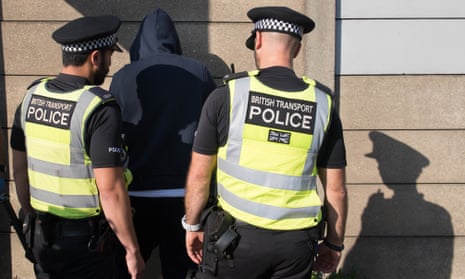Young black males in London were 19 times more likely to be stopped and searched than the general population, a study of official data shows.
The tactic, dogged by claims of racial profiling, was concentrated in deprived areas, and the success rate for searches turning up something potentially unlawful had fallen from two years ago, the research by University College London’s institute for global city policing found.
Researchers examined official stop and search data in the capital from July to September, when 67,997 people and vehicles were stopped by officers.
Of those stops, 97% were carried out by the Metropolitan police, the rest by City of London and British Transport Police officers.
The Met reacted by saying it was not targeting young black males and only deployed stop and search in high violence and high crime areas, taking thousands of weapons a year off the streets.
Victor Olisa, a former lead for the Met on stop and search, said the study revealed profiling, which was shredding confidence in Britain’s biggest force.
To carry out a stop an officer needs to have reasonable suspicion of an offence, with 95% of reasons given being drugs, weapons or stolen goods.
The study also found that young black males were 28 times more likely to be stopped on suspicion of carrying weapons than the general population.
Increases in stops by the Met have been justified as being necessary to tackle knife crime. The study found one in six reasons for a stop was for weapons, while 65% was for drugs.
The research looked not just at the ethnicity of who was being stopped, but their age and gender, and found huge disparities. More than nine in 10 stops were of males, with the young much more likely to be stopped.
The study said: “Being male and being aged under 35 are more powerful predictors of a group having a higher search rate than that group being non-white. The reasons for these differences are likely to be complex: many types of offending are concentrated among some groups (particularly young men) as well as in some neighbourhoods, and there are longstanding issues of bias and stereotyping among police and in society.”
The study also found that the success rate for stops had fallen, from 28% in 2018 to 22% between March and September this year.
Half of the searches occurred in 9% of neighbourhoods and 69% of searches were in neighbourhoods more deprived than average.
Commander Jane Connors, who leads on combating violence for the Met, told the Guardian: “We don’t target young black males with stop and search.
“We put stop and search into areas with the most violence and the most crime. A lot of those areas have high deprivation.”
Connors said that 5,000 weapons, including guns and serrated knives designed to kill, were taken off the street every year: “Stop and search is an investigative tool and it’s about being able to look for these items people should not have.”
She said the vast majority of around 250,000 stops a year are carried out professionally and the Met was conscious that in black communities, they enjoyed lower trust and confidence.
Olisa, who led on stop and search for the force from 2006 to 2008 and was a lead on diversity in 2016-17, said: “For me this is clear evidence the Met is targeting young black boys based on stereotypes and not backed by reasonable suspicion.
“This clearly does not represent evidence-based policing or intelligence-led policing. It indicates it has become more random than it was before.”
The former Met chief superintendent said black people in London, including the young and professionals, increasingly did not feel they were being “policed by consent”, which is the guiding philosophy of British law enforcement.
“Given this data I would question whether the black community would feel they are being policed by consent,” he said.
“My friends and family living in London who are black, do not feel they are being policed by consent.”
Dr Matt Ashby, who led the UCL study, said: “There is no question young black males are much more likely to be searched. The only question is are the Met justified in doing so.
“The proportion of searches that are for the most harmful items such as weapons is going down and the proportion of searches resulting in no further action going up, which suggests searches may have become less effectively targeted as the number of searches increased in the past two years.”
